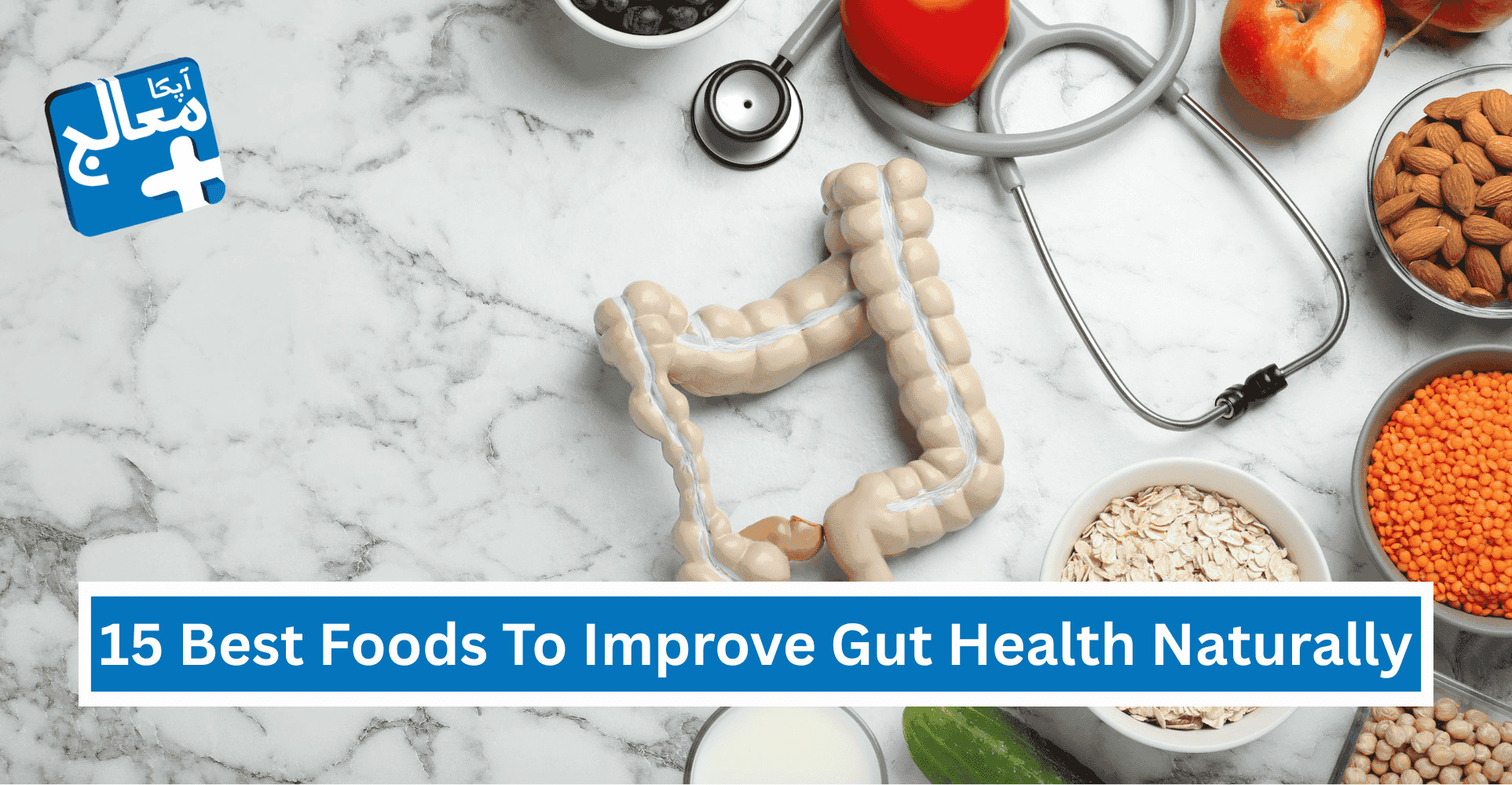15 Best Foods To Improve Gut Health Naturally: What Doctors Say?

The human digestive system plays a key role in overall health by absorbing nutrients and eliminating waste. Poor gut health can lead to issues like bloating, cramping, gas, constipation, diarrhea, and heartburn. In short, a healthy gut supports a healthy body. In this blog, we will learn how to improve gut health naturally.
If you want to consult with the top stomach specialists or gastro doctors near you, contact Apka Muaalij now!
Also read: "How Does Detox Water Benefit You to Boost Your Health & Body?"
What is Gut Health?
It is commonly believed that the gut is located around the belly button or refers only to the stomach, but in reality, the gut refers to the entire digestive system. The gut microbiome refers to the microorganisms living in your intestines. Each person has a mix of over 200 species of bacteria, viruses, and fungi, which significantly impacts health. While some microbes are harmful, many are essential. A diverse gut microbiome may help lower the risk of conditions such as diabetes, IBD, GERD, Crohn's disease, and more. The gut is also known as the digestive system or the gastrointestinal (GI) tract.
Importance of Gut Microbiome
The large intestine (colon) plays a crucial role in maintaining gut health. It houses the gut microbiome, a vast community of trillions of bacteria and other microbes that help digest nutrients, especially fiber. When these microbes are balanced, your gut is healthy. However, when harmful bacteria outnumber the beneficial bacteria, problems arise, including autoimmune diseases.
According to Harvard Health Publishing:
“A healthy gut contributes to a strong immune system, heart health, brain health, improved mood, healthy sleep, and effective digestion.”
You may also like to read "Managing Diabetes: The Role of Diet, Exercise, and Medication"
Signs of Poor Gut Health
The main reasons for all the symptoms of poor gut health are due to an imbalance between good and bad gut bacteria, including these symptoms:
-
Bloating: Excess gas production.
-
Constipation: Lack of fiber and dehydration.
-
Diarrhea: Gut inflammation or infection.
-
Gas and Flatulence: Fermentation of undigested food.
-
Abdominal Pain or Cramping: Inflammation in the digestive tract or irritation caused by poor bacterial balance.
-
Heartburn or Acid Reflux: Imbalance in stomach acid or slow digestion.
-
Fatigue and Low Energy: Poor nutrient absorption or inflammation.
-
Bad Breath (Halitosis): Poor digestion and bacterial overgrowth in the gut can lead to foul-smelling breath.
-
Mood Swings: Gut bacteria produce neurotransmitters like serotonin (a feel-good hormone). A low level of healthy microbiome is linked with a low level of serotonin, leading to depression, anxiety, irritability, and mood swings.
-
Frequent Illness or Infections: A weak gut microbiome impairs the immune system.
You may also like: "21 Surprisingly Effective Strategies To Prevent Heart Attack"
Prebiotics vs. Probiotics
| Property | Probiotics | Prebiotics |
|---|---|---|
| Definition | Probiotics are live bacteria present in certain foods. When consumed, they provide several health benefits. | Prebiotics are high-fiber foods that act as food for probiotics, allowing them to function properly and effectively. |
| Examples of Food | Fermented foods like yogurt and sauerkraut (فرمنٹ شدہ تیز مصالحے دار بند گوبھی). | Fruits, vegetables, and whole grains. |
| Benefits | Add more microbes to the gut. | Make existing microbes multiply and increase in efficiency. |
15 Best Foods to Improve Gut Health Naturally
The following are the probiotic foods that quickly improve your gut health:
1. Yogurt (دہی)
-
Made from fermented milk, especially by lactic acid bacteria and Bifidobacteria.
-
Helps with digestive issues like bloating, constipation, and diarrhea.
-
Contains probiotics, protein, vitamin B12, and phosphorus.
2. Kimchi (فرمنٹ شدہ تیز مصالحے دار بند گوبھی)
-
Korean spicy fermented cabbage dish.
-
Rich in nutrients and antioxidants that may help prevent some types of cancer.
-
Source of fiber, vitamins B6 and A, calcium, and iron.
3. Kefir (دودھ سے بنی ایک فرمنٹ شدہ مشروب)
-
Similar to yogurt, a fermented milk drink that is tart and more liquid.
-
Reduces inflammation and decreases the risk of heart disease.
-
Contains probiotics, proteins, calcium, and vitamin D.
4. Sauerkraut (کھٹی بند گوبھی)
-
A German fermented cabbage made with only cabbage and salt.
-
Supports bowel movement regularity, reduces bloating and gas.
-
Rich in vitamin C, K, iron, and fiber.
5. Tempeh (سویا بین سے تیار کردہ ایک پروٹین والی خمیری غذا)
-
Traditional Indonesian dish made from fermented soybeans.
-
Improves gut microbiome, aids digestion, and boosts overall health.
-
High in dietary fiber, protein, and vitamins B6, B12, and B2.
6. Kombucha (خمیر شدہ میٹھی چائے)
-
Naturally fermented fizzy tea beverage.
-
May protect against health conditions like high cholesterol and type 2 diabetes.
-
Contains antioxidants, B vitamins (B1, B2, B6, B12), and caffeine.
Also, go through: "9 Folic Acid Benefits, Usage, Importance, & More"
7. Miso (خمیر شدہ سویا)
-
Japanese fermented soybean paste is used in soups.
-
Aids digestion and supports gut lining and immunity.
-
Rich in protein, sodium, calcium, magnesium, and vitamins.
8. Apple
-
Contains pectin, a soluble fiber that acts as a prebiotic.
-
Feeds good gut bacteria and supports a balanced microbiome.
9. Bananas
-
Unripe (green) bananas contain resistant starch, a prebiotic fiber.
-
Feeds beneficial bacteria like Bifidobacteria.
10. Garlic
-
Rich in inulin and FOS (fructo-oligosaccharides), prebiotic fibers.
-
Aids digestion, relieves constipation, and has anti-inflammatory properties.
11. Chia Seeds (تخم ملنگا)
-
Contains soluble fiber that forms a gel-like consistency in the gut.
-
Acts as a prebiotic, feeding beneficial gut bacteria.
12. Onions
-
Rich in inulin, it acts as a prebiotic.
-
Promotes gut flora diversity, essential for digestion and mental health.
13. Asparagus (ہَزاری دانہ)
-
Rich in inulin, a type of prebiotic fiber.
-
Feeds beneficial bacteria like Bifidobacteria.
14. Whole Grains
-
Oats, brown rice, quinoa, barley, and whole wheat are full of fiber.
-
Boost healthy gut flora and improve bowel movement regularity.
15. Dark Green Vegetables
-
Spinach, kale, broccoli, collards, and mustard greens are high in fiber.
-
Insoluble fiber adds bulk to stool; soluble fiber feeds good bacteria.
Also Read: "Health Benefits of Yogurt - Nutrition Facts, Types, and Usage"
Final Thoughts
Prioritizing gut health naturally through nutrient-rich foods like prebiotics, probiotics, fruits, and vegetables can significantly boost digestion, immunity, and overall well-being. A healthy gut supports a healthy life—start with small changes today. Your body and mind will thank you.
For more information on gut health, you can consult top gastroenterologists near you by visiting www.apkamuaalij.com. For quick consultation, call 042-3238-0001 and book your in-person or online doctor's appointment through Apka Muaalij — the best digital healthcare platform.
FAQs (Frequently Asked Questions)
How do I repair my gut?
Eat probiotic and prebiotic-rich foods, avoid processed food, and manage stress.
What are the worst foods for gut health?
Highly processed foods, artificial sweeteners, and excessive alcohol.
What should I eat to clear my gut?
Fiber-rich fruits, vegetables, and plenty of water to support regular bowel movements.
How to check gut health?
You can assess it through symptoms or get a gut microbiome test via your doctor or lab services.
Which drink is good for digestion?
Warm water with lemon, ginger tea, and kefir are excellent choices.
What is the quickest way to heal your gut?
Eliminate inflammatory foods and start a diet rich in fermented and fiber-filled foods.
How to keep the stomach healthy and clean?
Maintain a balanced diet, hydrate well, sleep enough, and eat slowly.

Dr. Bisma Shehzadi
Dr. Bisma Shehzadi, Pharm.D, RPh, is working as a professional seasoned content writer with 4 years of experience in healthcare and wellness writing. With a strong pharmaceutical background and clinical knowledge, she creates research-driven, search-optimized articles that simplify complex medical topics. Her writing enables her to craft content that educates, promotes wellness, and supports healthcare initiatives among online users and readers.